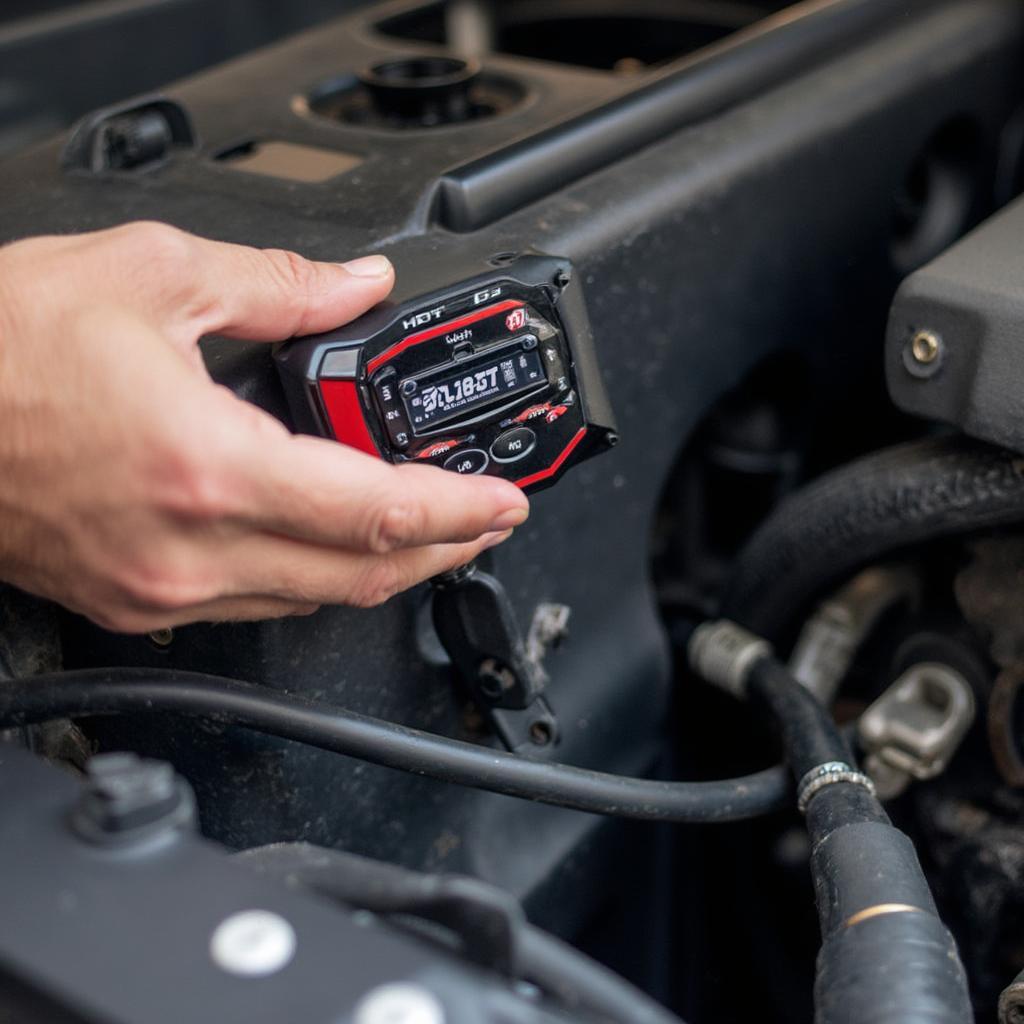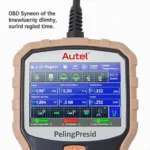Tuning box OBD2 devices offer a seemingly simple way to boost your vehicle’s performance. These small devices plug into your car’s OBD2 port and claim to adjust various parameters to increase horsepower and torque, and even improve fuel economy. But do they really work? This article dives deep into the world of tuning box OBD2, exploring their functionality, potential benefits, drawbacks, and crucial considerations before making a purchase.
What exactly is a tuning box OBD2? It’s a device designed to alter the engine control unit’s (ECU) parameters, impacting fuel injection, ignition timing, and boost pressure (in turbocharged engines). While the idea of a simple plug-and-play performance upgrade is appealing, understanding the complexities and potential implications is crucial. You should be aware of the potential risks and rewards associated with this type of modification. A more thorough understanding of OBD2 tuning boxes is essential for making informed decisions. Let’s explore this further.
How Does a Tuning Box OBD2 Work?
A tuning box OBD2 intercepts and modifies the signals between the ECU and the engine’s various sensors. By altering these signals, it tricks the ECU into adjusting fuel delivery, ignition timing, and other parameters to achieve the desired performance gains. Manufacturers often claim significant horsepower and torque increases, alongside improved fuel efficiency. However, the reality is often more nuanced. Some tuning boxes simply increase fuel pressure, leading to a richer fuel mixture and a slight power bump but potentially at the cost of increased emissions and fuel consumption. More sophisticated units may adjust other parameters like ignition timing, but the extent of these adjustments and their overall impact can vary significantly.
You can learn more about specific tuning boxes in our nitro obd2 performance chip tuning box review.
The Potential Benefits and Drawbacks of a Tuning Box OBD2
The allure of tuning box OBD2 devices often lies in the promise of easy and affordable performance gains. However, it’s important to understand both the potential advantages and disadvantages.
Potential Benefits:
- Increased Horsepower and Torque: Some users report noticeable improvements in acceleration and overall performance.
- Improved Fuel Economy (in some cases): Certain tuning boxes claim to optimize fuel consumption, although this is often debated.
- Easy Installation: The plug-and-play nature of these devices makes installation relatively simple.
- Reversibility: It’s easy to remove the tuning box and revert to the vehicle’s original settings.
Potential Drawbacks:
- Voiding Warranty: Installing a tuning box can potentially void your vehicle’s warranty.
- Increased Engine Stress: Pushing the engine beyond its factory settings can lead to increased wear and tear.
- Potential for Damage: Malfunctioning or poorly designed tuning boxes can potentially damage the ECU or other engine components.
- Exaggerated Claims: Manufacturers often overstate the performance gains achievable with their products.
What to Consider Before Buying a Tuning Box OBD2
Choosing the right tuning box OBD2 requires careful consideration. Several factors should influence your decision. Think about these key points:
- Vehicle Compatibility: Ensure the tuning box is specifically designed for your vehicle’s make, model, and engine.
- Manufacturer Reputation: Research the manufacturer and look for reviews from other users.
- Features and Adjustments: Consider the specific features offered and the level of adjustability available.
- Price: While affordability is attractive, be wary of unusually cheap tuning boxes, as they may be of inferior quality.
- Warranty and Support: Look for a manufacturer that offers a warranty and reliable customer support.
For diesel applications, check out our resource on the obd2 diesel chip tuning box.
Is a Tuning Box OBD2 Right for You?
Ultimately, the decision of whether or not to install a tuning box OBD2 depends on your individual needs and priorities. If you’re looking for a simple and potentially cost-effective way to gain a modest performance boost, a tuning box might be worth considering. However, it’s crucial to weigh the potential risks and benefits carefully. “Remember, while a tuning box can offer improvements, it’s not a magic bullet,” says automotive engineer, David Miller. “Understanding your car’s limitations and choosing a reputable product are crucial for a positive experience.”
Tuning Box OBD2 vs. Chip Tuning: What’s the Difference?
While both aim to enhance performance, tuning boxes and chip tuning differ significantly. A tuning box modifies the signals going to the ECU, while chip tuning involves reprogramming the ECU itself. Chip tuning generally offers more precise and comprehensive performance gains but requires specialized equipment and expertise. “Chip tuning allows for a deeper level of customization and optimization,” explains automotive electronics specialist, Sarah Chen. “However, it’s a more complex and potentially risky procedure compared to installing a tuning box.” If you’re interested in chip tuning, you might find more information about chiptuning box obd2.
Conclusion
Tuning box OBD2 devices offer a tempting route to increased vehicle performance, but it’s essential to approach them with realistic expectations and a thorough understanding of their potential impact. While they can offer modest gains in horsepower and torque, they are not a replacement for proper tuning and modifications. Carefully consider the potential risks, research reputable manufacturers, and choose a product compatible with your specific vehicle. By doing so, you can make an informed decision about whether a tuning box OBD2 is the right choice for you. If you’re looking for an economy-focused tuning box, you can find more information about obd2 economy chip tuning box.
FAQ
- Will a tuning box OBD2 damage my engine? A poorly designed or malfunctioning tuning box can potentially damage your engine. Choose a reputable brand and ensure compatibility with your vehicle.
- How much horsepower can I gain from a tuning box OBD2? The claimed horsepower gains vary significantly between manufacturers and are often exaggerated. Expect modest increases rather than dramatic improvements.
- Is it easy to install a tuning box OBD2? Yes, these devices are generally plug-and-play and easy to install.
- Will a tuning box OBD2 void my car’s warranty? Installing a tuning box can potentially void your warranty. Check with your dealer or manufacturer.
- Can I remove the tuning box OBD2 and return my car to stock? Yes, tuning boxes are easily removable, allowing you to revert to the vehicle’s original settings.
- What is the difference between a tuning box and chip tuning? A tuning box modifies signals to the ECU, while chip tuning reprograms the ECU itself. Chip tuning generally offers more significant but also riskier performance gains.
- Are tuning boxes OBD2 legal? The legality of tuning boxes can vary depending on local regulations. It’s crucial to check the regulations in your area.
For diesel engines, you might also want to explore our article about nitro obd2 chip tuning box for diesel engines.
Need assistance? Contact us via WhatsApp: +1(641)206-8880, or Email: [email protected]. Our customer support team is available 24/7.


